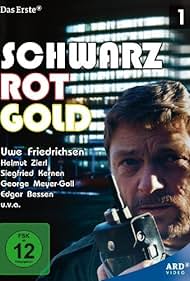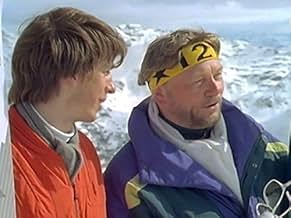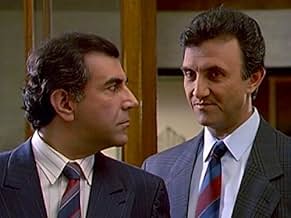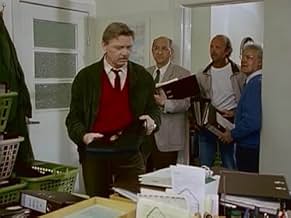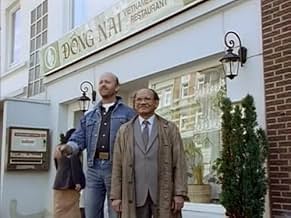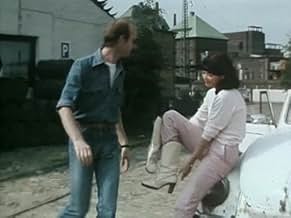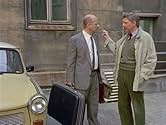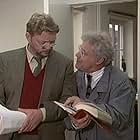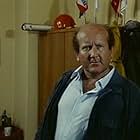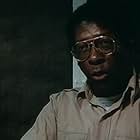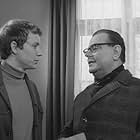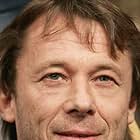Aggiungi una trama nella tua linguaBlack Red Gold is the title of an ARD television series with Uwe Friedrichsen.Black Red Gold is the title of an ARD television series with Uwe Friedrichsen.Black Red Gold is the title of an ARD television series with Uwe Friedrichsen.
Sfoglia gli episodi
Trama
Lo sapevi?
Recensione in evidenza
In the film "Bowling for Columbine", controversial American film maker Michael Moore suggested the reality TV-program "Cops" to be replaced by another: "Corporate Cops", wherein the protagonists would go after business crime and arrest CEOs instead of black people with knives. Mr. Moore, look no further, because this is actually it.
The show tells about of a bunch of government agents and bureaucrats working for the German Customs Investigation Office at Hamburg. They are probably the kind of people which usually, the viewer learns to hate: they're said to live off other people's tax payments, they dabble in other people's business and keep the economy from being free and efficient. This show, however, shows the whole thing from the viewpoint of the bureaucrats. We have Hobel (Siegfried Kernen), the typical bureaucrat with the big glasses and the porn magazine under his desk, we have Doellke (George Meyer-Goll), the anarchistic new guy with beard and pony tail under his bald head, and we have, of course, grim, but honest Zaluskowski (Uwe Friedrichsen from Edgar-Wallace-fame), all of them working in the same shabby office, having to visit a number of dirty places, experiencing about every kind of dishonesty and hostility along their way, and all of them trying to make the big bosses of economy play by the rules knowing even if they ever got one of them convicted, that they will never even be half as wealthy as the least important of their opponents' lawyers.
One sequence shows Zaluskowski looking at the giant swimming pool underneath the big house of the CEO he has just convicted of a fraud which has cost not only billions of European tax money, but also several hundreds of jobs and the only thing Zaluskowski is able to say, sighing, is: "Yes. That may have been worth it." The honesty about himself and his own feelings is, admittedly, one of the aspects which make Uwe Friedrichsen's character great. Occasional guest stars are usually from German TV and theater, most of them rarely known outside of Germany, but with wonderful character actors such as "Torn Curtain's" Günther Strack, Peter Pasetti, Herbert Fux, Dieter Eppler and Pinkas Braun (of Edgar-Wallace-fame, too). The greatest thing about the show is, however, the scripts.
Unfortunately, I have to admit it to Mr. Dick Hurlin, the producer of "cops": a show like this doesn't have much action in it. Since it deals with matters such as tax evasion, fuel tax, subsidy fraud, embezzlement and business crime, and tries to do it on a very serious but entertaining way, there is naturally a lot of talk, explaining, controversial dialog, and even some almost documentary sequences. Sometimes, it is like real life: a lot of crime goes unpunished. Sometimes, they get the small fish only, while the big one gets his ass "bailed out". Sometimes, they get the big fish only while all the small ones slip away. Sometimes, the crime is exposed, but no one can be punished at all.
Besides its criticism of some aspects of economy, this show is far from being a "socialist" program. The episode "Vereinigungskriminalität" (literally: "reunification crime") finds the old team transferred to the Eastern part of the reunified Germany where it is their sad and frustrating duty to help clean up the economical nightmare that has been caused by over 40 years of socialistic mismanagement.
The show does NOT "blame it all on capitalism" or on some villainous CEO meant to represent it. Rather, it criticizes the often unnecessarily complicated law (EU law in particular) or the way some people with the obvious intention of doing something good sometimes make it all too easy for others to loot and to exploit exactly the people which were originally meant to be protected and supported. Look at my summary of the episode "Hammelsprung" for an example. Most of the time, the protagonists are not even up against actual business crime or some CEO's great bunch of lawyers, but against themselves: other bureaucrats and government agents and directives that turn out to be somewhat contradictional. The show does not even criticize capitalism at all. It just shows and explains some of the numerous both good and bad side effects which we seem to have agreed about taking up with. If you are looking for simple black-and-white solutions and the blaming of only one side, do not watch this show. It is always very well researched, takes its time to explain things and tries to show every side of the things and the people in question. It takes its time to explain that business crime, tax evasion and embezzlement of subsidies isn't just "being cleverer than others" or making money out of nothing, but that it actually has (negative) influence on the whole society and environment, that it means actually taking other people's money, welfare or jobs. Usually, when Zaluskowski and his team have convicted a villain, he will almost certainly excuse his crime with the rest of his competitors: "If I had not done it someone else of them would have." While Zaluskowski or in this case, Hobel will answer: "If that was true and everyone was thinking just the same, your crime would have achieved you no advantage at all. No, there always must be some honest idiot left to make the ugly business pay off!"
If someone thinks, the government would do best just to stick out of business and economy then probably even this show won't convince him otherwise. However, it may help him to understand why there are people thinking differently.
The show tells about of a bunch of government agents and bureaucrats working for the German Customs Investigation Office at Hamburg. They are probably the kind of people which usually, the viewer learns to hate: they're said to live off other people's tax payments, they dabble in other people's business and keep the economy from being free and efficient. This show, however, shows the whole thing from the viewpoint of the bureaucrats. We have Hobel (Siegfried Kernen), the typical bureaucrat with the big glasses and the porn magazine under his desk, we have Doellke (George Meyer-Goll), the anarchistic new guy with beard and pony tail under his bald head, and we have, of course, grim, but honest Zaluskowski (Uwe Friedrichsen from Edgar-Wallace-fame), all of them working in the same shabby office, having to visit a number of dirty places, experiencing about every kind of dishonesty and hostility along their way, and all of them trying to make the big bosses of economy play by the rules knowing even if they ever got one of them convicted, that they will never even be half as wealthy as the least important of their opponents' lawyers.
One sequence shows Zaluskowski looking at the giant swimming pool underneath the big house of the CEO he has just convicted of a fraud which has cost not only billions of European tax money, but also several hundreds of jobs and the only thing Zaluskowski is able to say, sighing, is: "Yes. That may have been worth it." The honesty about himself and his own feelings is, admittedly, one of the aspects which make Uwe Friedrichsen's character great. Occasional guest stars are usually from German TV and theater, most of them rarely known outside of Germany, but with wonderful character actors such as "Torn Curtain's" Günther Strack, Peter Pasetti, Herbert Fux, Dieter Eppler and Pinkas Braun (of Edgar-Wallace-fame, too). The greatest thing about the show is, however, the scripts.
Unfortunately, I have to admit it to Mr. Dick Hurlin, the producer of "cops": a show like this doesn't have much action in it. Since it deals with matters such as tax evasion, fuel tax, subsidy fraud, embezzlement and business crime, and tries to do it on a very serious but entertaining way, there is naturally a lot of talk, explaining, controversial dialog, and even some almost documentary sequences. Sometimes, it is like real life: a lot of crime goes unpunished. Sometimes, they get the small fish only, while the big one gets his ass "bailed out". Sometimes, they get the big fish only while all the small ones slip away. Sometimes, the crime is exposed, but no one can be punished at all.
Besides its criticism of some aspects of economy, this show is far from being a "socialist" program. The episode "Vereinigungskriminalität" (literally: "reunification crime") finds the old team transferred to the Eastern part of the reunified Germany where it is their sad and frustrating duty to help clean up the economical nightmare that has been caused by over 40 years of socialistic mismanagement.
The show does NOT "blame it all on capitalism" or on some villainous CEO meant to represent it. Rather, it criticizes the often unnecessarily complicated law (EU law in particular) or the way some people with the obvious intention of doing something good sometimes make it all too easy for others to loot and to exploit exactly the people which were originally meant to be protected and supported. Look at my summary of the episode "Hammelsprung" for an example. Most of the time, the protagonists are not even up against actual business crime or some CEO's great bunch of lawyers, but against themselves: other bureaucrats and government agents and directives that turn out to be somewhat contradictional. The show does not even criticize capitalism at all. It just shows and explains some of the numerous both good and bad side effects which we seem to have agreed about taking up with. If you are looking for simple black-and-white solutions and the blaming of only one side, do not watch this show. It is always very well researched, takes its time to explain things and tries to show every side of the things and the people in question. It takes its time to explain that business crime, tax evasion and embezzlement of subsidies isn't just "being cleverer than others" or making money out of nothing, but that it actually has (negative) influence on the whole society and environment, that it means actually taking other people's money, welfare or jobs. Usually, when Zaluskowski and his team have convicted a villain, he will almost certainly excuse his crime with the rest of his competitors: "If I had not done it someone else of them would have." While Zaluskowski or in this case, Hobel will answer: "If that was true and everyone was thinking just the same, your crime would have achieved you no advantage at all. No, there always must be some honest idiot left to make the ugly business pay off!"
If someone thinks, the government would do best just to stick out of business and economy then probably even this show won't convince him otherwise. However, it may help him to understand why there are people thinking differently.
- diger_jantzen
- 12 feb 2009
- Permalink
I più visti
Accedi per valutare e creare un elenco di titoli salvati per ottenere consigli personalizzati
Dettagli
Contribuisci a questa pagina
Suggerisci una modifica o aggiungi i contenuti mancanti

Divario superiore
By what name was Schwarz Rot Gold (1982) officially released in Canada in English?
Rispondi